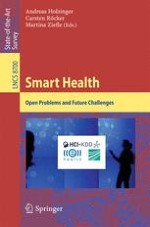2015 | OriginalPaper | Chapter
Medicine and Health Care as a Data Problem: Will Computers Become Better Medical Doctors?
Authors : Michael Duerr-Specht, Randy Goebel, Andreas Holzinger
Published in: Smart Health
Publisher: Springer International Publishing
Activate our intelligent search to find suitable subject content or patents.
Select sections of text to find matching patents with Artificial Intelligence. powered by
Select sections of text to find additional relevant content using AI-assisted search. powered by
